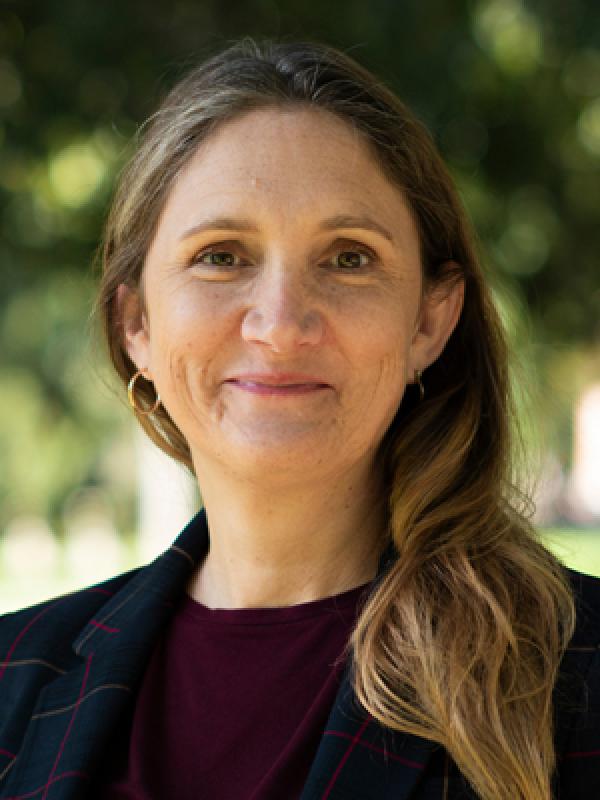Kendra McSweeney

Contact Information
Professor
Areas of Expertise
- Human-Environment Interactions
- Cultural and Political Ecology
Education
- 2000 Ph.D., Geography, Dean’s Honour List, McGill University, Montreal
- 1993 M.Sc. Geography, University of Tennessee, Knoxville.
- 1991 B.A., Geography and Environmental Studies, First Class Honors, McGill University, Montreal.
Current CV:
Interests: Human-Environment Interactions, Cultural and Political Ecology
Current Research:
My primary interest is in human-environment interactions, with focus on issues in cultural and political ecology, conservation and development, resilience, demography, and land use/cover change. Current projects include (1) tracing the socioecological impacts of drug trafficking through Central America, and (2) studying the nature and implications of demographic change among Latin America's indigenous populations.
Courses Taught:
Geography 2800: Our Global Environment
Geography 4101: Undergraduate Research and Professionalization Seminar
Geography 7102: Fieldwork in Human Geography
Select Awards & Recognition's:
- American Association for the Advancement of Science (AAAS), Elected Fellow, 2024
- Phi Beta Kappa Visiting Scholar, Phi Beta Kappa Society, Washington, DC, 2024-25
- American Academy of Arts & Sciences, Elected Fellow, 2023
- Distinguished Scholar Award, Ohio State, 2021
- Alexander and Ilse Melamid Medal, American Geographical Society, 2020
- Cultural and Political Ecology (CAPE) Distinguished Career Award, Association of American Geographers, 2020
- Carl O. Sauer Award, Conference of Latin Americanist Geographers, 2020
- Joan N. Huber Faculty Fellow Award for Excellence in the Social and Behavioral Sciences, Ohio State, 2019
- Distinguished Undergraduate Research Mentor Award, Ohio State, 2012
- Alumni Award for Distinguished Teaching, Ohio State, 2005
Select Publications:
Dutta, M., and K. McSweeney. 2023. Undergraduates' experience of Geography in US universities. Transactions of the Institute of British Geographers. https://doi.org/10.1111/tran.12623
McSweeney, K. 2023. Prohibition geographies: afterward for special issue on “Illicit Ecologies and Contested Environments.” Political Geography.
Pearson, Z., A. Skiba, K. McSweeney, E. A. Nielsen, J. T. Piccorelli. 2022. Acknowledging cocaine capital in Central American development. Journal of Illicit Economies and Development 4(2):160–176.
Ballvé, T., and K. McSweeney. 2020. The ‘Colombianization’ of Central America: misconceptions, mischaracterizations, and the military-agroindustrial complex. Journal of Latin American Studies. doi:10.1017/S0022216X20000668.
McSweeney, K. 2020. Cocaine trafficking and the transformation of Central American frontiers. Journal of Latin American Geography 19(3):159-166
McSweeney, K. 2020. Reliable drug war data: the Consolidated Counterdrug Database and cocaine interdiction in the ‘Transit Zone.’ International Journal of Drug Policy 80 (June), 102719
McSweeney, K., and E. Nielsen. 2020. Climate change in Central America: the drug war connection. Georgetown Journal of International Affairs
Magliocca, N., K. McSweeney, S.E. Sesnie, E. Tellman, J.A. Devine, E.A. Nielsen, Z. Pearson, and D. J. Wrathall. 2019. Modeling cocaine traffickers and counterdrug interdiction forces as a complex adaptive system. Proceedings of the National Academy of Sciences (PNAS). DOI.org/10.1073/pnas.1812459116
McSweeney, K., D. Wrathall, E. Nielsen, Z. Pearson. 2018. Grounding traffic: the cocaine commodity chain and land grabbing in eastern Honduras. Geoforum. https://doi.org/10.1016/j.geoforum.2018.07.008
McSweeney, K., N. Richani, Z. Pearson, J. Devine, and D.J. Wrathall. 2017. Why do narcos invest in rural land? Journal of Latin American Geography 16(2): 3-30.
Sesnie, S., B. Tellman, D. Wrathall, K. McSweeney, E. Nielsen, K. Bennesaiah, O. Wang, L. Rey. 2017. A spatio-temporal analysis of forest loss related to cocaine trafficking in Central America. Environmental Research Letters 12:1-19.
Piperata, B., K. McSweeney, R. Murrieta. 2016. Conditional cash transfers, food security and health: biocultural insights for poverty-alleviation policy from the Brazilian Amazon. Current Anthropology 57(6): 806-826.
McSweeney, K., and B. Jokisch. 2015. Native Amazonians’ strategic urbanization: shaping territorial possibilities through cities. Journal of Latin American and Caribbean Anthropology 20(1): 13-33.
McSweeney, K., E.A. Nielsen, M.J. Taylor, D.J. Wrathall, Z. Pearson, O. Wang, and S.T. Plumb. 2014. Drug policy as conservation policy: narco-deforestation. Science 343 (31 January): 489-490.
McSweeney, K., and O.T. Coomes, 2011. Climate-related disaster opens window of opportunity for rural poor in northeastern Honduras. Proceedings of the National Academy of Sciences (PNAS) 108(13):5203-5208.
McSweeney, K. 2020. Three things ZeroZeroZero gets right about the cocaine trade. The Conversation.
